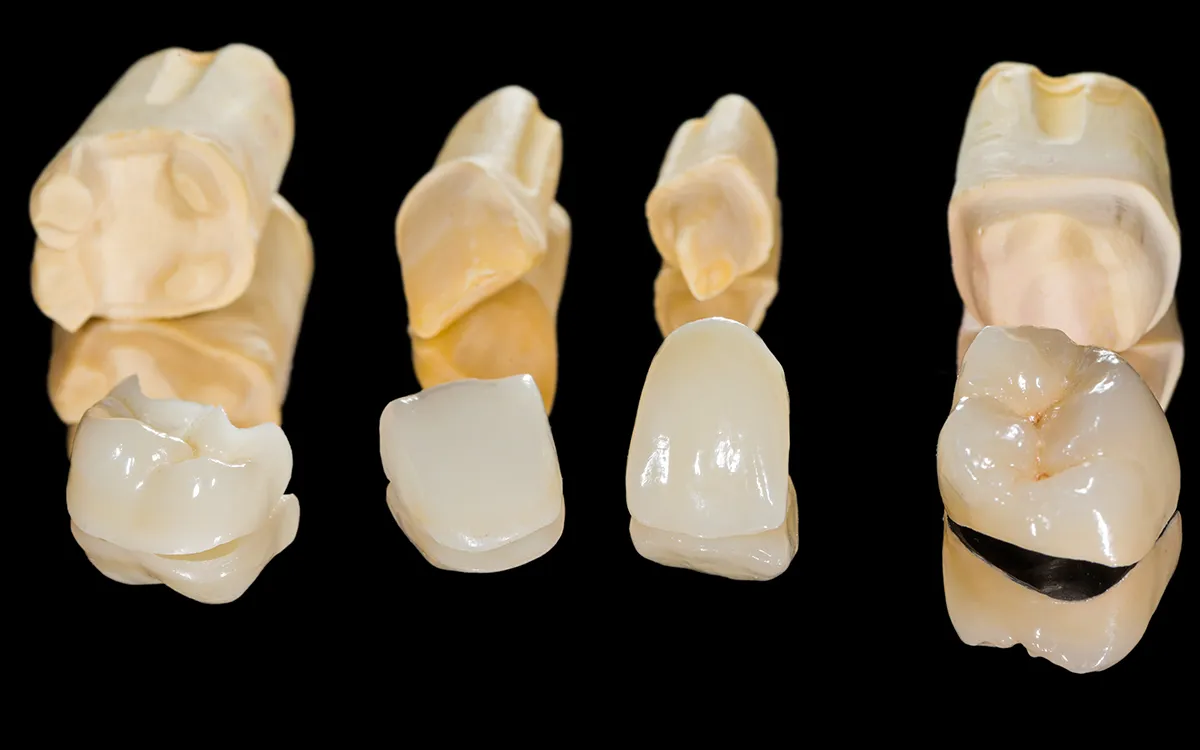Tiny tooth cracks might seem like they’re no big deal, especially if there’s no pain yet. You might think a quick patch or seal will do the trick, but these are not bathroom tiles. Cracked teeth are much trickier! If you try a simple fix on the surface, you’ll hide deeper damage which was a major factor causing the crack to show up in the first place.
Think of it like a structural crack in a wall. You can paint over it, but why did that wall crack in the first place? A wall or a tooth can fracture for many reasons such as pressure, age or stress, but it always points to a deeper issue. Dental crowns can restore that lost strength and stability, protecting the tooth from further damage and helping it function like new again.
Here, we’ll explore what a dental crown is, why it’s often the best solution for a cracked tooth, and how it protects your smile far better than a simple patch-up.
What is a dental crown?
A dental crown, sometimes called a cap, is a custom-made covering that fits over your tooth to bring back its natural shape, strength, and appearance. It protects what’s left of your tooth and holds it together, preventing further cracking or wear.
Modern crowns are made from strong, lifelike materials such as zirconia or ceramic. These materials are carefully matched to your natural tooth colour and translucency, so your restored tooth blends in seamlessly — and often looks even better than before.
You can think of a crown as a little helmet for your tooth. It shields it from pressure, biting forces, and everyday wear, letting you chew, smile, and speak comfortably and confidently again.

Why a cracked tooth needs more than a patch
When a tooth cracks, the damage often goes deeper than what you can see on the surface. The structure of the tooth has been weakened, which means it’s more vulnerable to further breakage.
Here’s the main difference:
- A filling or bonding can repair small, shallow issues like cavities or minor chips.
- A crown, on the other hand, protects the entire tooth when its structure is at risk of splitting apart.
Even a fine hairline crack can spread each time you bite or chew, much like how a small crack in glass widens with pressure. A filling only covers the top layer, but it can’t stop that deeper pressure from travelling through the tooth. Over time, the crack can grow, leading to sensitivity, infection, or even tooth loss.
That’s why dentists often recommend a crown for cracked teeth. It acts as a strong, protective cover that holds the tooth together, preventing the crack from spreading and keeping your natural tooth safe for years to come.
Who needs a tooth cap?
Dental crowns aren’t just for cracked teeth, though that’s one of the most common reasons people get them. They’re also used to protect teeth that have become heavily decayed, weak, or damaged.
You might need a crown if you have:
- A cracked or fractured tooth that still has healthy roots and can be saved
- A tooth with extensive decay that can’t be restored with a simple filling
- A large filling that’s left the remaining tooth structure fragile
- A tooth that’s had a root canal, which can make it more brittle
- A tooth worn down from grinding or erosion
- A discoloured or misshapen tooth you’d like to improve cosmetically
In short, a crown is recommended when your tooth can no longer be safely supported by a filling alone. It gives your tooth a second chance — restoring its strength, shape, and natural beauty so you can chew and smile with confidence again.

Why crowns beat surface-level fixes
Fillings and bonding absolutely have their place in restorative and cosmetic dentistry. They’re great for small cavities, tiny chips, or touch-ups. But when the damage goes deeper or the tooth is already weakened, these “quick fixes” just can’t hold up to the pressure of everyday chewing.
Here’s why crowns are often the gold standard for cracked or heavily damaged teeth:
Full protection: A crown covers the entire tooth, not just the damaged part. It seals the tooth from bacteria, pressure, and further wear.
Prevents further cracking: The crown acts like a protective shell, reinforcing the tooth and stopping cracks from spreading.
Restores strength and function: You can bite and chew with confidence again, without worrying about pain or the tooth breaking apart.
Natural appearance: Modern crowns are carefully crafted to match your tooth’s shape and shade. Once it’s in place, it blends beautifully with the rest of your smile.
Long-lasting solution: With good oral care and regular dental check-ups, crowns can last for many years — making them a reliable, long-term investment in your oral health.
In comparison, fillings and bonding can loosen, chip, or fail over time, especially on teeth that already have cracks or significant wear. A crown gives your tooth the solid protection it needs to stay strong and stable for the long run.
What to expect during your dental crown treatment
Getting a crown is a straightforward and comfortable process, and your dentist will make sure you’re at ease throughout. The treatment usually happens over two visits, though some modern clinics can now complete it in a single day using advanced digital systems such as CEREC.
It all starts with a detailed consultation. Your dentist will discuss your concerns, take digital X-rays, and often use an intraoral scanner to get a clear, 3D view of your teeth. This helps them assess the extent of the damage and plan your treatment precisely, ensuring the best possible fit and outcome.

Once it’s confirmed that a crown is needed, your dentist will gently reshape the tooth and remove any weak or decayed areas. This creates a strong, stable base for your new crown. A digital scan or impression is then taken to design a crown that fits perfectly with your bite and looks completely natural.
When your custom crown is ready, your dentist will securely bond it to your tooth and make any final adjustments for comfort and alignment. The result is a tooth that looks great, feels strong, and works just like before.
Caring for your crown and your smile
Even though a crown is made from strong, durable materials, it still needs a bit of care and attention — just like your natural teeth. Excellent oral hygiene and regular dental visits will help keep your crown in great shape and your smile healthy for years to come.
Here are a few simple ways to make your crown last:
- Brush twice a day and floss daily, especially around the edges of your crown where plaque can build up.
- See your dentist regularly for check-ups and professional cleaning to make sure everything stays in great condition.
- Avoid chewing on hard items like ice, pens, or hard lollies — even the strongest crowns can crack under enough force.
- If you grind your teeth, talk to your dentist about a custom night guard to protect both your crown and your natural teeth.
With proper care, a well-made crown can last many years, keeping your tooth protected and your smile looking its best.
Your smile deserves full protection
A cracked tooth is a major sign that your oral health needs a little extra care. When it shows up, it means your tooth needs appropriate support to stay strong and healthy. If your dentist suggests a dental crown, it’s probably not only about restoring your smile’s great looks. These robust restorative treatments are all about protecting the health of your natural teeth and preventing bigger problems later on.
If you’ve noticed a crack, chip, or any discomfort when chewing, you really can’t wait for it to get worse. Seeing your dentist early can help save your tooth before more damage occurs. It’s a small step now that makes a big difference for your smile’s future.
At the end of the day, prevention is always the best care. Keep up with your regular dental visits, brush and floss daily, and treat your teeth kindly. Stay consistent in your oral health routine today so you can enjoy a strong, bright, and healthy smile for years to come.


